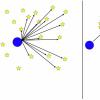New study:
http://www.sciencedirect.com/science/article/pii/S0939475314000088?np=y
Inverse association between habitual polyphenol intake and incidence of cardiovascular events in the PREDIMED study
Abstract
Background and aims
Epidemiologic and biological evidence supports an inverse association between polyphenol consumption and the risk of cardiovascular disease. However, no previous studies have prospectively evaluated the relationship between polyphenol intake and the incidence of cardiovascular disease (CVD) in such a comprehensive way. The aim was to evaluate the association between intakes of total polyphenol and polyphenol subgroups, and the risk of major cardiovascular events (myocardial infarction, stroke or death from cardiovascular causes) in the PREDIMED study.
Methods and results
The present work is an observational study within the PREDIMED trial. Over an average of 4.3 years of follow-up, there were 273 confirmed cases of CVD among the 7172 participants (96.3%) who completed a validated 137-item food frequency questionnaire (FFQ) at baseline. Polyphenol consumption was calculated by matching food consumption data from the FFQ with the Phenol-Explorer database on polyphenol content of each reported food. After multivariate adjustment, a 46% reduction in risk of CVD risk was observed comparing Q5 vs. Q1 of total polyphenol intake (HR = 0.54; 95% confidence interval [CI] = 0.33–0.91; P-trend = 0.04). The polyphenols with the strongest inverse associations were flavanols (HR = 0.40; CI 0.23–0.72; P-trend = 0.003), lignans (HR = 0.51; CI 0.30–0.86; P-trend = 0.007), and hydroxybenzoic acids (HR = 0.47; CI 0.26–0.86; P-trend 0.02).
Conclusion
Greater intake of polyphenols, especially from lignans, flavanols, and hydroxybenzoic acids, was associated with decreased CVD risk. Clinical trials are needed to confirm this effect and establish accurate dietary recommendations.
Notes on the study from Nutra-ingredients:
http://www.nutraingredients-usa.com/Research/Polyphenols-may-slash-heart-disease-risk
For their new study, the researchers used the Phenol-Explorer database to evaluate the polyphenol intakes of 7,172 participants of the study, and the potential associations with cardiovascular events, including heart attack, stroke or death from cardiovascular causes.
Over the course of 4.3 years of follow-up, the researchers documented 273 cases of CVD.
Crunching the numbers revealed that the highest overall intakes of polyphenols (an average of 1,170 milligrams per day) were associated with a 46% reduction in the risk of CVD, compared to the lowest overall intakes (an average of 562 mg per day).
In addition, other statistically significant associations were observed for subclasses of polyphenols, including lignans (a 49% reduction associated with the highest average intakes (0.94 mg/d) vs the lowest average intakes (0.44 mg/d)), anthocyanins (a 33% reduction associated with the highest average intakes (11.8 mg/d) vs the lowest average intakes (74.6 mg/d)), and dihydrochalcones (a 37% reduction associated with the highest average intakes (5.8 mg/d) vs the lowest average intakes (0.8 mg/d)).
“We conclude that there is an inverse association between total polyphenol intake and risk of cardiovascular-related events that is independent of other dietary and non-dietary CVD risk factors,” they wrote. “Similar significant associations were established for lignans, flavanols, and hydroxybenzoic acids. Further randomized controlled trials are needed to confirm the promising protective effects of polyphenols on CVD and establish dietary recommendations and desired minimum levels of intake.”















































